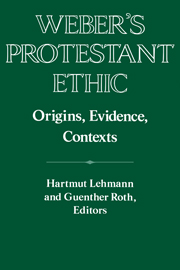Book contents
- Frontmatter
- Introduction
- Part I Background and Context
- Part II Reception and Response
- 10 The Longevity of the Thesis: A Critique of the Critics
- 11 The Use and Abuse of Textual Data
- 12 Biographical Evidence on Predestination, Covenant, and Special Providence
- 13 The Thing that Would Not Die: Notes on Refutation
- 14 Historical Viability, Sociological Significance, and Personal Judgment
- 15 The Historiography of Continental Calvinism
- 16 The Protestant Ethic and the Reality of Capitalism in Colonial America
- 17 The Economic Ethics of the World Religions
- 18 “Meet Me in St. Louis”: Troeltsch and Weber in America
- Index
11 - The Use and Abuse of Textual Data
Published online by Cambridge University Press: 05 January 2013
- Frontmatter
- Introduction
- Part I Background and Context
- Part II Reception and Response
- 10 The Longevity of the Thesis: A Critique of the Critics
- 11 The Use and Abuse of Textual Data
- 12 Biographical Evidence on Predestination, Covenant, and Special Providence
- 13 The Thing that Would Not Die: Notes on Refutation
- 14 Historical Viability, Sociological Significance, and Personal Judgment
- 15 The Historiography of Continental Calvinism
- 16 The Protestant Ethic and the Reality of Capitalism in Colonial America
- 17 The Economic Ethics of the World Religions
- 18 “Meet Me in St. Louis”: Troeltsch and Weber in America
- Index
Summary
Since its publication in 1904-1905 as a two-part article, Max Weber's thesis on the Protestant ethic has been the focus of the longest running debate in modern social science. The first round of exchanges between Weber and his principal critics, H. Karl Fischer and Felix Rachfahl, lasted until 1910. Weber subsequently incorporated these exchanges in revisions to The Protestant Ethic, responding as well to criticism from Sombart's Der Bourgeois (1913), Brentano's Die Anfdnge des modernen Kapitalismus (1916), and other writings. Since Weber's death, every aspect of his thesis has been attacked by torrents of criticism from Andre Bieler, C. H. George and K. George, Gabriel Kolko, Herbert Liithy, Alan Macfarlane, Stephen Ozment, H. M. Robertson, Kurt Samuelsson, H. R. Trevor-Roper, Immanuel Wallerstein, and others who have not displayed much interest in methodological issues pertaining to interpretative procedures in social science. This development is doubly unfortunate, for Weber wrote extensively on these methodological issues. He began writing The Protestant Ethic in 1903 immediately upon completing part of the methodological critique that would be published as Roscher and Knies; moreover, The Protestant Ethic relies on a carefully delineated interpretative procedure that, as Weber admitted, is susceptible to misunderstanding. Benighted efforts to “test” a “Protestant ethic thesis” by analyzing correlations between religious affiliation and economic status represent the more extreme misunderstandings that are possible.
- Type
- Chapter
- Information
- Weber's Protestant EthicOrigins, Evidence, Contexts, pp. 245 - 272Publisher: Cambridge University PressPrint publication year: 1993
- 3
- Cited by



